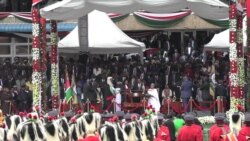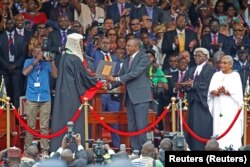Kenya's months-long political roller coaster finally came to an end in November, when President Uhuru Kenyatta was sworn in for his second term.
After the country's August polls, in which Kenyatta was declared the winner over Raila Odinga, the Supreme Court annulled the presidential election, citing irregularities in the transmission of election results.
In its ruling, the Supreme Court highlighted the electoral commission, or IEBC's, refusal of a court order to open its computer servers.
"[That] leaves us with no option but to accept the petitioners claims that the IEBC's IT system was infiltrated and compromised and the data therein interfered with — or IEBC's officials themselves interfered with — the data or simply refused to accept that it had bungled the whole transmission system and were unable to verify the date," Kenya's Deputy Chief Justice Philomena Mwilu said.
Consequently, the court ordered the IEBC to hold a new poll within 60 days. After continued demands for IEBC reforms, Odinga decided to withdraw from the October 26 re-run election, and urged his supporters to boycott the polls.
Kenyatta was announced the winner of the second election, but Odinga argued that Kenyatta lacked legitimacy given the low voter turnout.
Two petitions filed in the Supreme Court challenged the decision, but this time, the court upheld the election results. Odinga responded by announcing the creation of a resistance movement and threatening to conduct his own inauguration.
That prompted a warning from Attorney General Githu Muigai.
"The criminal law of the Republic of Kenya in Article 40 of the penal code provides or stipulates that that sort of process is high treason," Muigai said. "It is high treason in respect of the person so involved and any other person facilitating that process."
Many fear the installation of Odinga as an alternative president could increase tension in a country where more than 70 people were killed during election-related violence.
Kenyans now wait to see if their newly elected officials will fulfill their campaign promises and promote peace in 2018.






